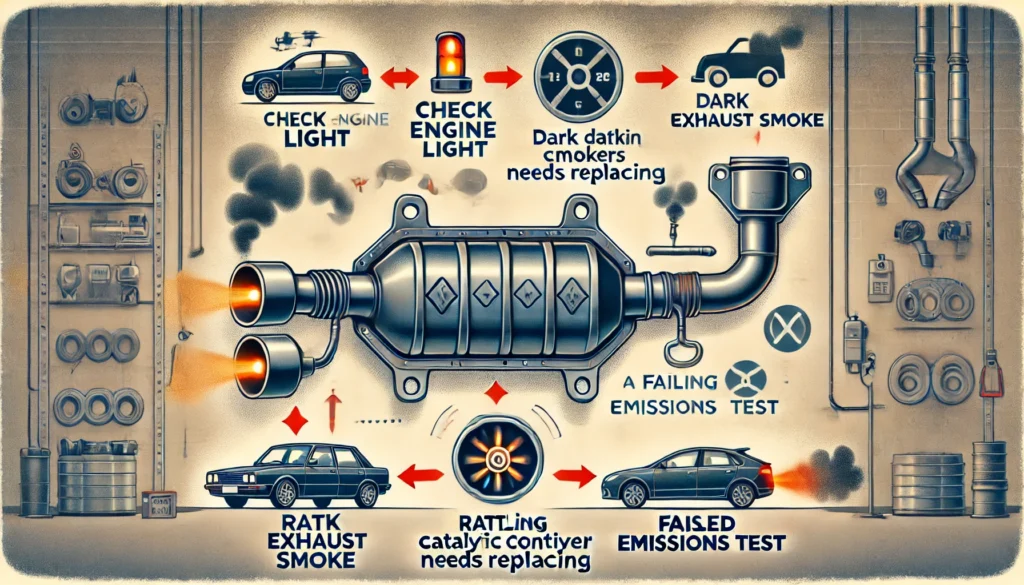A catalytic converter is a critical component of your vehicle’s exhaust system, responsible for reducing harmful emissions and ensuring your car runs efficiently. However, like all parts, catalytic converters can wear out over time, leading to a range of issues. But how do i know if my catalytic converter needs replacing? In this blog post, we’ll explore the key signs that indicate your catalytic converter may be failing and when it’s time to consider a replacement.

What Does a Catalytic Converter Do?
Before diving into the signs of a failing catalytic converter, it’s essential to understand its function. The catalytic converter is designed to convert harmful gases like carbon monoxide, nitrogen oxides, and hydrocarbons into less harmful substances like carbon dioxide and water vapor. This process not only reduces the vehicle’s environmental impact but also helps meet emissions standards.
Signs That Your Catalytic Converter Needs Replacing
Here are the most common signs that your catalytic converter might be failing and in need of replacement:
1. Check Engine Light Is On
One of the most straightforward indicators of a catalytic converter issue is the illumination of the check engine light. Modern vehicles are equipped with sensors that monitor the exhaust system, including the catalytic converter. If these sensors detect abnormal levels of emissions, they’ll trigger the check engine light.
2. Poor Engine Performance
A failing catalytic converter can restrict the flow of exhaust gases, leading to poor engine performance. You may notice sluggish acceleration, reduced power, and a general lack of responsiveness. If your car struggles to reach its usual speeds or feels weaker than usual, it could be due to a clogged or damaged catalytic converter.
3. Dark or Black Exhaust Smoke
Healthy exhaust emissions should be clear or light-colored. If you see dark or black smoke coming from your exhaust pipe, it’s a sign that your catalytic converter isn’t effectively processing the exhaust gases. This could be due to a clog or internal damage.
4. Unusual Noises
Another sign that your catalytic converter needs replacing is unusual noises coming from underneath your vehicle. If you hear a rattling noise, it could mean that the internal components of the catalytic converter have broken apart. This is often more noticeable when starting the car or during acceleration.
5. Sulfur or Rotten Egg Smell
A strong sulfur or rotten egg smell from your exhaust is a clear sign that the catalytic converter is not functioning correctly. This odor is caused by hydrogen sulfide, a byproduct of incomplete combustion. A failing catalytic converter can no longer convert this gas into odorless emissions, leading to the unpleasant smell.
6. Failed Emissions Test
If your vehicle fails an emissions test, it’s often due to a faulty catalytic converter. Emissions tests measure the levels of pollutants in your vehicle’s exhaust, and a failing catalytic converter will not meet the required standards. If you’ve failed an emissions test, it’s time to have your catalytic converter inspected and possibly replaced.
When to Replace Your Catalytic Converter
If you’re experiencing one or more of the above symptoms, it’s essential to have your vehicle inspected by a professional mechanic. They can confirm whether the catalytic converter is the source of the problem and recommend the appropriate course of action. In some cases, the issue may be resolved through cleaning or minor repairs, but if the catalytic converter is severely damaged, replacement is usually necessary.
Preventing Catalytic Converter Failure
To extend the life of your catalytic converter and avoid premature replacement, consider the following maintenance tips:
- Regular Engine Maintenance: Keep your engine well-maintained to prevent issues like misfires or oil leaks that can damage the catalytic converter.
- Use High-Quality Fuel: Avoid using low-quality fuel that can lead to carbon build-up in the exhaust system.
- Address Issues Promptly: If you notice any signs of engine trouble, address them immediately to prevent damage to the catalytic converter.
Conclusion
Knowing when your catalytic converter needs replacing can save you from more extensive and costly repairs down the road. By paying attention to the signs of a failing catalytic converter and maintaining your vehicle properly, you can ensure that your car remains efficient and environmentally friendly. If you suspect your catalytic converter is failing, don’t delay—consult with a mechanic to get it checked and replaced if necessary.
